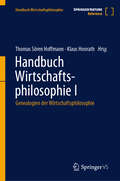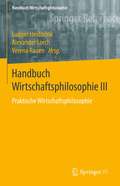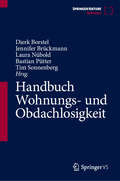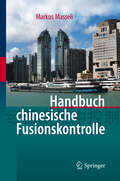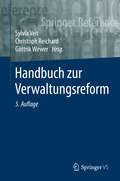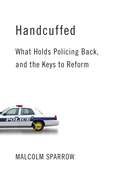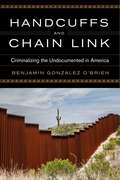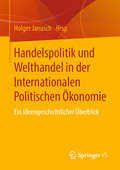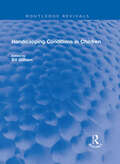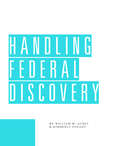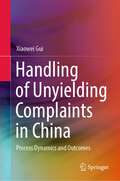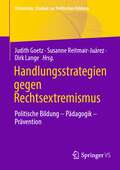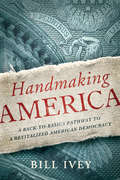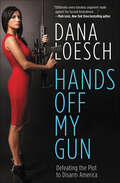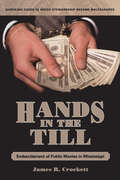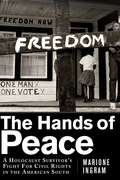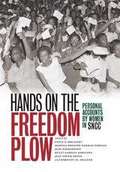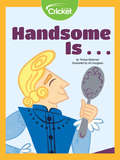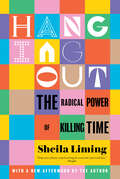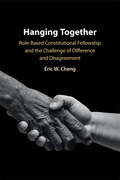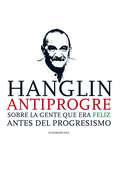- Table View
- List View
Handbuch Wirtschaftsphilosophie I: Genealogien der Wirtschaftsphilosophie (Handbuch Wirtschaftsphilosophie)
by Thomas Sören Hoffmann Klaus HonrathDer erste Band des Handbuches Wirtschaftsphilosophie soll der Genese wirtschaftsphilosophischer Fragestellungen gewidmet sein. Die Darstellung erfolgt sowohl in historischer wie in kultureller Brechung: Auf die Vorstellung der Reflexion auf das Ökonomische in der Antike, dem Mittelalter und der frühen Neuzeit folgen Längsschnitte zu den wichtigsten wirtschaftsphilosophischen Denkrichtungen und Schulen vor allem in Europa (Wirtschaftsphilosophie in Deutschland, England, Frankreich, Italien, Nordamerika).
Handbuch Wirtschaftsphilosophie III: Praktische Wirtschaftsphilosophie (Handbuch Wirtschaftsphilosophie)
by Ludger Heidbrink Alexander Lorch Verena RauenDas Ziel des Bandes besteht darin, einen Überblick über die Grundfragen, Kernthemen und Handlungsfelder der praktischen Wirtschaftsphilosophie zu geben. Zu diesem Zweck befasst sich Teil I einführend mit dem Verhältnis von Ökonomie und Ethik, der Verbindung zwischen Wirtschaft, Gesellschaft und Politik sowie dem Zusammenhang von Globalisierung, Transnationalisierung und Interkulturalität. Teil II setzt sich mit den Kernthemen der praktischen Wirtschaftsphilosophie auseinander. Es werden Begriffe und Themen vorgestellt, die sowohl für die ökonomische Wissenschaft als auch für die Realökonomie relevant sind. Hierzu zählen systematische und normative Begriffe wie Präferenzen, Rationalität oder Regeln, Grundlagenthemen wie Freiheit, Verantwortung oder Gerechtigkeit und operative Themenfelder wie Handel, Markt, Kooperation oder Digitalisierung. Teil III beschäftigt sich abschließend aus wirtschaftsphilosophischer Perspektive mit zentralen Praxisfeldern der Ökonomie. Dazu gehören das Verhältnis von Unternehmens- und Konsumentenverantwortung, die Rolle von Stakeholder-Beziehungen, Shared Value-Ansätze, die Verbindung von Governance und Institutionen sowie alternative Wirtschaftsformen und die Wirtschaftspolitik.Das Handbuch Wirtschaftsphilosophie verbindet in interdisziplinärer Perspektive philosophische Grundlagenreflexion mit theoretischer und praktischer Erschließung des ökonomischen Handelns. Methodisch werden dabei wissenschaftstheoretische, normative, kulturbezogene und historische Aspekte miteinander verbunden.
Handbuch Wohnungs- und Obdachlosigkeit
by Dierk Borstel Tim Sonnenberg Jennifer Brückmann Laura Nübold Bastian PütterDer Band gibt umfassend Auskunft zur theoretischen und empirischen Forschung sowie zur Praxis im Umgang mit wohnungs- und obdachlosen Menschen. Er beinhaltet dabei unterschiedliche Ansätze, Verständnisweisen und auch konträre Positionen zum Thema. Der Band richtet sich an Wissenschaftler*innen, Studierende und Praktiker*innen im Themenfeld.
Handbuch chinesische Fusionskontrolle
by Markus Masseli, Dipl.-Kfm., LL.M.eurDas Handbuch ermöglicht eine Risikoeinschätzung geplanter Fusionen und dient als Argumentationshilfe und Anleitung für Fusionskontrollverfahren in China. Es orientiert sich an den für die Praxis maßgeblichen Gesichtspunkten und geht dabei auf die chinesische Fallpraxis und die Diskussion in der chinesischen Rechtsliteratur ein. Berücksichtigung finden auch die politischen und kulturellen Besonderheiten Chinas. Der Anhang enthält Übersetzungen der wichtigsten Rechtsvorschriften, juristischer Entscheidungen sowie Formulare.
Handbuch energiesparende Halbleiterbauelemente – Hochintegrierte Chips: Bedeutung · Fertigung und Produktion · Technischer Fortschritt
by Engelbert Westkämper Hartmut Frey Bernd HintzeDurch die Fähigkeit, nahezu jedes Gerät oder Produkt mit Sensoren oder Funketiketten zu verbinden, können Unternehmen intelligente Netzwerke betreiben. Daneben darf die Bedeutung der klassischen Märkte für die Möglichkeit der Umsetzung – wie schnelle Server, energiesparende Clouds usw. – nicht übersehen werden. Fast ein Fünftel des gesamten digitalen Energieverbrauchs benötigen Rechenzentren, genauso viel wie alle internetfähigen Geräte selbst. Höchstintegrierte, schnelle und energiesparende Chips werden zur Schlüsseltechnologie insbesondere für den Zukunftsmarkt Smart Mobility. Dieses Buch gibt einen umfassenden Überblick über die Möglichkeiten, Eigenschaften und Fertigungstechnologien solcher Halbleiterbauelemente.
Handbuch zur Verwaltungsreform (Springer Reference Sozialwissenschaften Ser.)
by Göttrik Wewer Sylvia Veit Christoph ReichardDas Thema Verwaltungsreform beschäftigt nach wie vor Bund, Länder und Gemeinden gleichermaßen. Konzeptionell sind die diskutierten Ansätze und Instrumente einem ständigen Wandel unterworfen und bei der Umsetzung von Maßnahmen besteht in großem Maße Unsicherheit und Orientierungsbedarf. Das Handbuch liefert einen Beitrag zur Einordnung unterschiedlicher Konzepte und Orientierung für die Umsetzung der Verwaltungsreform. In 66 Beiträgen werden vielfältige Ansätze der Verwaltungsreform vorgestellt, ihr Entstehungszusammenhang erläutert, praktische Anwendungsfelder beschrieben und Entwicklungsperspektiven untersucht. Die Beiträge stammen von renommierten WissenschaftlerInnen und erfahrenen PraktikerInnen. Themenblöcke: Staat und Verwaltung, Reform- und Managementkonzepte, Steuerung und Organisation, Personal, Finanzen, Ergebnisse und Wirkungen, Erfahrungen und Perspektiven. Die Hälfte der Beiträge dieser Auflage wurde komplett neu geschrieben und die restlichen Beiträge wurden gründlich überarbeitet.
Handcuffed: What Holds Policing Back, and the Keys to Reform
by Malcolm K. SparrowWhatever happened to community and problem-oriented policing? How the current crisis in policing can be traced to failures of reform.The police shooting of an unarmed young black man in the St. Louis, Missouri, suburb of Ferguson earlier this year sparked riots and the beginning of a national conversation on race and policing. Much of that conversation has focused more on social issues. Malcolm Sparrow, who teaches at Harvard's Kennedy School and is a former British police detective, argues in this new book that there is another dimension that played a role not only in Ferguson but in many other high-profile police killings of unarmed blacks: the character of policing itself.Sparrow shows how police departments across America have shelved the traditional ideas of community policy-the cop on the beat how knows his or her neighborhood and its inhabitants-and also simple problem solving when it comes to crime to focus on crime reduction. That has meant a reliance on quantitative methods where police define how well they are doing by tallying up how many traffic tickets have been issued (Ferguson), or arrests made for petty crimes (Eric Garner selling nontaxed cigarettes in New York). The list goes on.Police departments need to shed this reliance on crime reduction metrics and mindsets and turn back to making public safety, and public cooperation, their primary goals.
Handcuffs and Chain Link: Criminalizing the Undocumented in America (Race, Ethnicity, and Politics)
by Benjamin Gonzalez O'BrienHandcuffs and Chain Link enters the immigration debate by addressing one of its most controversial aspects: the criminalization both of extralegal immigration to the United States and of immigrants themselves in popular and political discourse. Looking at the factors that led up to criminalization, Benjamin Gonzalez O’Brien points to the alternative approach of the Immigration Reform and Control Act of 1986 and how its ultimate demise served to negatively reinforce the fictitious association of extralegal immigrants with criminality. Crucial to Gonzalez O’Brien’s account thus is the concept of the critical policy failure—a piece of legislation that attempts a radically different approach to a major issue but has shortcomings that ultimately further entrench the approach it was designed to supplant. The IRCA was just such a piece of legislation. It highlighted the contributions of the undocumented and offered amnesty to some while attempting to stem the flow of extralegal immigration by holding employers accountable for hiring the undocumented. The failure of this effort at decriminalization prompted a return to criminalization with a vengeance, leading to the stalemate on immigration policy that persists to this day.
Handel im chinesischen Imperium der frühen Neuzeit: Wirtschaftliches Denken und die Stellung der Kaufleute
by Tengda HuaDieses Buch erforscht die wichtige Rolle der Kaufleute im frühen modernen China. Im Gegensatz zu den europäischen Kaufleuten galten ihre chinesischen Kollegen in der Vor-Qin-Zeit lange Zeit als soziale Parias, trotz des Reichtums, den sie erwirtschafteten. In dieser Monographie soll untersucht werden, ob sich die Stellung der Kaufleute im Ming-Reich im Vergleich zu ihren Vorgängern verbessert hat und wie die chinesische Monarchie mit Händlern umgegangen ist. Es werden die Beziehungen zwischen Staat und Händlern untersucht, deren Rolle auf dem Markt sich im Umgang mit verschiedenen wirtschaftlichen Aktivitäten wie Marktmonopol, Handelsbesteuerung, internationalem Handel und Konsum niederschlägt.Das Buch richtet sich an Studenten und Forscher, die sich für die Geschichte der Frühen Neuzeit, den östlichen Handel, die Ming-Kaufleute und zeitgenössische globale Angelegenheiten interessieren.
Handelskrieg und Handelsgespräche zwischen China und den USA
by Miaojie YuDieses Buch konzentriert sich auf die aktuellen Spannungen zwischen China und den USA im Zusammenhang mit dem Handelsungleichgewicht und erörtert Chinas Öffnungsstrategie im Kontext dieses Handelskonflikts. Das Buch gliedert sich in zwei Teile. Im ersten Teil legt der Autor eine detaillierte Analyse des aktuellen Stands der Handelsbeziehungen zwischen China und den USA vor und beschreibt die möglichen Auswirkungen von Handelskonflikten zwischen China und den USA. Zu den in diesem Teil behandelten Themen gehören die Neuschätzung des US-Handelsdefizits mit China, Chinas Status als Nicht-Marktwirtschaft, die Auswirkungen der bilateralen Investitionsabkommen zwischen China und den USA auf Chinas verarbeitende Industrie sowie die geschätzten Wohlfahrtsverluste und -gewinne, die sich aus dem Handelskrieg zwischen China und den USA ergeben. Teil II untersucht Chinas mögliche Reaktion und Entwicklungsstrategie im Kontext der De-Globalisierung. Ausgehend von einem Überblick über die drei Phasen der chinesischen Wirtschaftsreform und Öffnungspolitik in den vergangenen vier Jahrzehnten erörtert der Autor die künftigen Aufgaben, die das Land in eine neue Phase der umfassenden Öffnung führen würden. Schließlich wird in dem Buch die Rolle der Handelsabwicklung, der Handelsliberalisierung und der Unternehmensleistung bei der Förderung von Chinas wundersamem Wirtschaftswachstum umfassend untersucht, um ein besseres Verständnis von Chinas Erfahrungen mit der Öffnung in den letzten vier Jahrzehnten zu fördern.
Handelspolitik und Welthandel in der Internationalen Politischen Ökonomie: Ein ideengeschichtlicher Überblick
by Holger JanuschDas Ziel dieses Buches ist die Vermittlung zentraler Begriffe, Theoreme und Hypothesen zum Welthandel und der Handelspolitik aus einer ideengeschichtlichen Perspektive. Neben volkswirtschaftlichen Außenhandelstheorien und deren Blick auf Wohlstand werden Klassiker der Internationalen Politischen Ökonomie vorgestellt, die ihren Schwerpunkt auf nachholende Entwicklung, Macht und zwischenstaatliche Abhängigkeiten sowie Institutionen und den Einfluss von Interessengruppen in der Handelspolitik legen.
Handicapping Conditions in Children (Routledge Revivals)
by Bill GillhamFirst published in 1986, Handicapping Conditions in Children provides an accessible overview of a wide range of handicapping conditions and their remediation, and gives a balanced perspective on the medical, educational and social issues. It will therefore be of value to a wide audience in these professions as well as to students and parents. Each chapter deals with one specific area but is presented to cover: description of the condition and its aetiology; its prevalence in the population and relatives; developmental characteristics; special problems and needs; educational and social provision; the potential for the future; and further reading lists. The book does not include every possible condition, but concentrates on those that are most frequent or problematic. This book is a reissue originally published in 1986. The language used is a reflection of its era and no offence is meant by the Publishers to any reader by this republication
Handling Federal Discovery
by William Audet Kimberly FanadyHandling Federal Discovery Strengthen your discovery work with William Audet and Kimberly Fanady's Handling Federal Discovery. Walk step-by-step through every discovery task, from setting discovery goals to deposing expert witnesses. The book's unique task outline format provides practical instruction and sophisticated strategies that help you handle your opponent's tricks and delay tactics. Organized by preparation task, it literally gives you the what, why, when, and how of moving a case through discovery, complete with practice tips and forms: * What and why -- The task is explained in plain English, detailing related rules and case law, along with the reasons for considering the task. * When -- A thorough discussion of the steps to be completed prior to beginning the task, along with deadlines for the task. * How -- The meat of the book, this section details each step necessary to effectively complete the task. Includes defenses against the efforts of your opponent. * Practice notes -- Here you will find strategies, arguments, cautions, and advice learned from decades in the courtroom. * Forms -- Discovery motions, documents, letters, and memoranda. Handling Federal Discovery gives you broad, organized coverage of essential federal discovery rules, practice tips and necessary forms that are applicable in federal and many state courts.
Handling of Unyielding Complaints in China: Process Dynamics and Outcomes
by Xiaowei GuiThis book provides a framework of protest handling which redirects our attention away from the strength of protesters and towards the constraints of state power, drawing on detailed case studies randomly collected in 7 provinces in China over the last decade. It finds that the challenges of retaining legitimacy, the propensity for responsiveness, the contradictions of the petition system, and the dynamics of elite alignments are key elements shaping the fate of nail-like petitions. A nail-like person refers to the individual who looks like a stubborn nail on a plank of wood that cannot be easily hammered down. His persistent protest thus is theoretically puzzling, since such individual-based protest is assumed to be too weak to effectively challenge a powerful authoritarian regime. Although this phenomenon is widely observed in China, it is ignored by current studies on collective action. Meanwhile, this book delves into the life politics of nail-like persons and reveals that their escalation of grievance, marginalized social status, inability of pursuing desirable lives through legitimate means, and communication with fellow petitioners also reinforce their determination of contention. This book describes deeply the fate of individual-based protests in China. It scrutinizes the state’s role in shaping contention at its macro, intermediate, and micro levels, and meanwhile pay more attention to local specifics that are crucial to uncovering the logic of petitioners' actions and consciousness. This book has implications for scholars and graduates who are interested in contentious politics and state-society interactions in China.
Handlungsstrategien gegen Rechtsextremismus: Politische Bildung - Pädagogik - Prävention (Citizenship. Studien zur Politischen Bildung)
by Dirk Lange Judith Goetz Susanne Reitmair-JuárezIn diesem Sammelband werden Erkenntnisse der Rechtsextremismusforschung über die Akzeptanz menschenverachtender Ideologien der Ungleichheit aufgegriffen und mit Ansätzen der Politischen Bildung, der Pädagogik und der Präventionsarbeit in Beziehung gesetzt. Der Schwerpunkt liegt auf Handlungsstrategien gegen Rechtsextremismus. Ausgehend von theoretischen Überlegungen zum Zusammenspiel von Rechtsextremismus und politischer Bildung werden diese mit pädagogischen Praxen in Beziehung gesetzt und Möglichkeiten und Hindernisse der Rechtsextremismusprävention nachgezeichnet.
Handmaking America: A Back-to-Basics Pathway to a Revitalized American Democracy
by Bill IveyAmerica has survived an economic near-disaster. While the state of employment and housing will one day improve, we will never return to the delusional prosperity that defined the first decade of the 21st century. Progressives should hold the key to quality of life in our coming post-consumerist society, but today Democrats have become timid, our vision of the good life marginalized by three decades of partisan attacks and the think tank-induced assumption that an unfettered marketplace, low taxes, and international adventurism will somehow give us an America capable of inspiring the world. Handmaking America, reaches back to the Arts-and-Crafts roots of progressive thought, confronting the way right-wing ideology and the power of post-industrial capitalism have undermined work, government; our very way of life, advancing a practical, achievable vision for a good society that can use the capacity of government to recover the essential strength of the American idea.
Hands Off My Gun: Defeating the Plot to Disarm America
by Dana LoeschRespected conservative talk show host, blogger and TV commentator Dana Loesch gives her views on the history and intent of the Second Amendment and discusses what she believes gun confiscation would mean to Americans' basic rights as citizens. How many people in America today are truly well-versed in the history of the Second Amendment, and why it was included in the Bill of Rights? In HANDS OFF MY GUN, Dana Loesch explains why the Founding Fathers included the right to bear arms in the Bill of Rights, and argues that "gun control" regulations throughout history have been used to keep minority populations under control. She also contends that current arguments in favor of gun control are primarily based on emotions and fear. This narrative is a must-read for every Second Amendment supporter. Dana Loesch is a determined and fierce advocate for those rights and shouts out: hands off my gun!
Hands in the Till: Embezzlement of Public Monies in Mississippi
by James R. CrockettIn 2004 the Corporate Crime Reporter asserted that Mississippi was the most crooked state in America. By comparing the number of federal corruption convictions over the past decade and the 2002 population of the state, the conclusion was inescapable. Too many officials were robbing the public they had sworn to serve and protect. Hands in the Till: Embezzlement of Public Monies in Mississippi establishes the scope of a major crisis in a poor state where needs are many and funds are scarce. The book highlights the tireless work of the Office of the State Auditor in investigating the theft of public money and bringing criminals to justice. This book reports on thirty-seven cases that demonstrate how and why embezzlement occurs, how it is discovered and investigated, and how the state’s justice system deals with perpetrators. The greedy schemes can be as outrageous as they are disheartening. Case histories narrated here involve a variety of public servants and others including chancery clerks, circuit clerks, justice court clerks, city clerks, sheriffs, tax collectors, school and college administrators, and employees of organizations that receive public money.
Hands of Peace: A Holocaust Survivor?s Fight for Civil Rights in the American South
by Marione Ingram Thelton HendersonBorn in Hamburg in the 1930s, Marione Ingram fled Nazi Germany, only to find racism as pervasive in the American South as anti-Semitism was in Europe. Marione moved first to New York and then to Washington, D. C. where, in 1960, she joined the Congress of Racial Equality, protesting discrimination in housing, employment, education, and other aspects of life in the nation's capital, including the denial of voting rights. In D. C. , Marione made a name for herself as a freedom fighter. She was a volunteer for the March on Washington and an organizer of an extended sit-in to support the Mississippi Freedom Party. A year later, at the urging of civil rights leader Fannie Lou Hamer, Marione went south to Mississippi. She was part of a coalition to end segregation and extend civil rights to African Americans--and she was uncompromising in her demand for equality. In Mississippi, Marione became a leader of the Student Nonviolent Coordinating Committee, as well as an educator at one of the country’s most influential Freedom Schools. The school was one of the targets of the Ku Klux Klan. When they burned a cross in front of it, she painted the word "FREEDOM" in bold letters on the charred crossbar, creating an icon in the struggle for equal rights. As a white woman and a Holocaust refugee, Marione was the most unlikely of heroes in the fight for civil rights for African Americans. This is her empowering story--a tale of courage, strength, and determination.
Hands on the Freedom Plow: Personal Accounts by Women in SNCC
by Betty Garman Robinson Martha Prescod Norman Noonan Dorothy M. Zellner Faith S. Holsaert Jean Smith Young Judy RichardsonIn Hands on the Freedom Plow, fifty-two women--northern and southern, young and old, urban and rural, black, white, and Latina--share their courageous personal stories of working for the Student Nonviolent Coordinating Committee (SNCC) on the front lines of the Civil Rights Movement. The testimonies gathered here present a sweeping personal history of SNCC: early sit-ins, voter registration campaigns, and freedom rides; the 1963 March on Washington, the Mississippi Freedom Summer, and the movements in Alabama and Maryland; and Black Power and antiwar activism. Since the women spent time in the Deep South, many also describe risking their lives through beatings and arrests and witnessing unspeakable violence. These intense stories depict women, many very young, dealing with extreme fear and finding the remarkable strength to survive. The women in SNCC acquired new skills, experienced personal growth, sustained one another, and even had fun in the midst of serious struggle. Readers are privy to their analyses of the Movement, its tactics, strategies, and underlying philosophies. The contributors revisit central debates of the struggle including the role of nonviolence and self-defense, the role of white people in a black-led movement, and the role of women within the Movement and the society at large. Each story reveals how the struggle for social change was formed, supported, and maintained by the women who kept their "hands on the freedom plow." As the editors write in the introduction, "Though the voices are different, they all tell the same story--of women bursting out of constraints, leaving school, leaving their hometowns, meeting new people, talking into the night, laughing, going to jail, being afraid, teaching in Freedom Schools, working in the field, dancing at the Elks Hall, working the WATS line to relay horror story after horror story, telling the press, telling the story, telling the word. And making a difference in this world."
Handsome Is...
by Teresa BatemanLancelot is a very handsome prince, known throughout the kingdom for his beauty! When he happens upon an old witch and her toad after getting lost in the woods, though, he finds that he can’t always rely on his looks to get him out of his problems. How will Lancelot ever get home? Discover the answer in this funny fairy tale.
Handwörterbuch des politischen Systems der Bundesrepublik Deutschland
by Wichard Woyke Jörg Bogumil Uwe Andersen Stefan MarschallDieses Buch bietet die Grundlagen zu allen wichtigen Aspekten des politischen Systems der Bundesrepublik Deutschland und eignet sich sowohl für politikwissenschaftliche Einführungskurse als auch zum Nachschlagen. Das Standardwerk wurde für die 6. Auflage komplett überarbeitett und erweitert.
Hanging Out: The Radical Power of Killing Time
by Sheila LimingA smart and empowering book about the simple art of hanging out ... and of taking back our social lives from the deadening whirl of contemporary life.Almost every day it seems that our world becomes more fractured, more digital, and more chaotic. Sheila Liming has the answer: we need to hang out more. Starting with the assumption that play is to children as hanging out is to adults, Liming makes a brilliant case for the necessity of unstructured social time as a key element of our cultural vitality. The book asks questions like what is hanging out? why is it important? why do we do it? how do we do it? and examines the various ways we hang out—in groups, online, at parties, at work. Hanging Out: The Radical Power of Killing Time makes an intelligent case for the importance of this most casual of social structures, and shows us how just getting together can be a potent act of resistance all on its own.
Hanging Together: Role-Based Constitutional Fellowship and the Challenge of Difference and Disagreement
by Eric W. ChengDifference and disagreement can be valuable, yet they can also spiral out of control and damage liberal democracy. Advancing a metaphor of citizenship that the author terms 'role-based constitutional fellowship,' this book offers a solution to this challenge. Cheng argues that a series of 'divisions of labor' among citizens, differently situated, can help cultivate the foundational trust required to harness the benefits of disagreement and difference while preventing them from 'overheating' and, in turn, from leaving liberal democracy vulnerable to the growing influence of autocratic political forces. The book recognizes, however, that it is not always appropriate to attempt to cultivate trust, and acknowledges the important role that some forms of confrontation might play in identifying and rectifying undue social hierarchies, such as racial-ethnic hierarchies. Hanging Together thereby works to pave a middle way between deliberative and realist conceptions of democracy.
Hanglin antiprogre: Sobre la gente que era feliz antes del Progresismo
by Rolando HanglinHanglin vuelve a la carga, más ácido, irreverente y polémico que nunca. La clase media argentina está cada vez más indignada y, en estecontexto, Rolando Hanglin vuelve a la carga, más irreverente y polémicoque nunca. Sin pelos en la lengua y dueño de un estilo que hace reír acarcajadas, Hanglin y su alter ego, el señor González, se animan adesmitificar la bondad intrínseca del progresismo, una caricatura delprogreso con el que nuestros antepasados alguna vez soñaron. Ese exalumno del Nacional Buenos Aires que vivió la revolución hippie de lossesenta hoy se sorprende frente a una generación que toma el colegioante el menor inconveniente, hace "pogo" en los recitales y sale abailar a las cuatro de la mañana. Como si fuera poco, repasa algunosmalentendidos de la historia argentina que dieron origen a lo que élllama "la deformación del progreso" y rescata la figura de próceres conmala prensa. Ya sea que hable de las señoras que leen novelas eróticasen sus ratos libres, de la onda swinger o de las campañas al desierto,Hanglin encarna la voz de un grupo de gente que se siente expulsado porun mundo al que no comprende.
